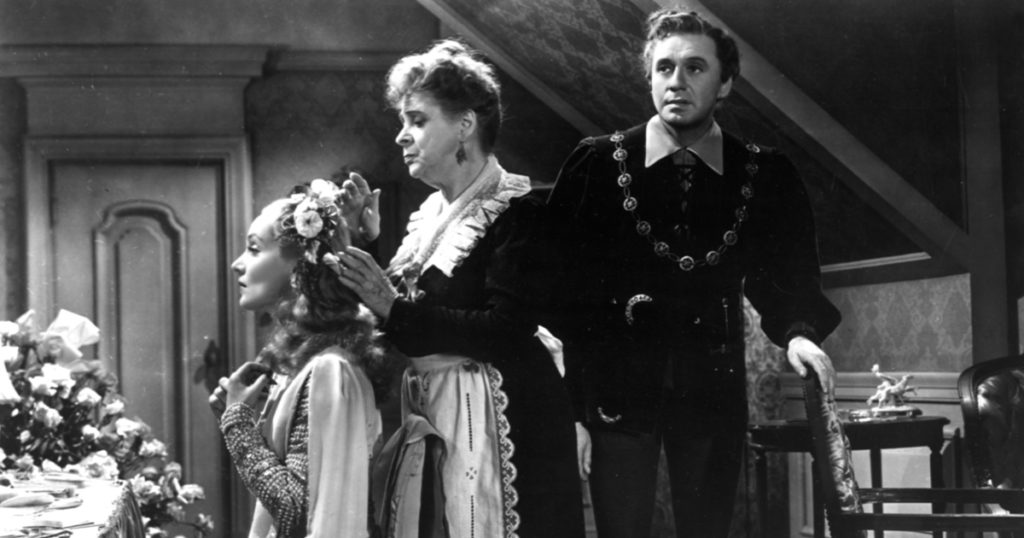
A master of the slow burn and the exaggerated double take, Jack Benny may have been the greatest of all persona comedians on radio and television. The persona was preposterously vain. He played the violin, badly. He would never admit to being older than 39. Above all else, he was cheap.
In his most celebrated radio routine, Jack is walking along carrying a borrowed Oscar award. A mugger stops him, asks him for a light, and then demands: “Your money or your life.” There ensues a lengthy silence. Finally the mugger says “Look, bud! I said your money or your life!” And Benny replies: “I’m thinking, I’m thinking!”
Benny plays five roles in Ernst Lubitsch’s comic masterpiece, To Be or Not To Be (1942), and in each of them, he is Jack Benny. We are in Warsaw in August 1939, and Benny is an actor in a troupe—in his own words, “that great, great actor Josef Tura,” whose ambition is to play Hamlet. Behind the scenes, he is the jealous husband of actress Maria Tura (the charming and justly acclaimed Carole Lombard, in her last film appearance), afraid he is being cuckolded. During the course of the film, he also plays a fictional Nazi colonel on stage, impersonates a real Nazi colonel, albeit badly, and impersonates a bewhiskered Professor Siletski (Stanley Ridges), who has passed himself off as a Polish resistance leader but is actually a Nazi spy.
Benny’s performance is one reason To Be or Not To Be is at or near the apex of classic Hollywood movies. A second reason is that there are few movies that mix reality and imposture to such superb effect, with artifice trumping actuality as the actors play their parts not on stage but in the streets and enemy headquarters of their Nazi-occupied city.
To Be or Not To Be meets the challenge of making merry while responding quite seriously, even eloquently, to the Nazis’ deadly threat to freedom and human life. The movie’s specific trigger is no laughing matter. The Molotov-Ribbentrop nonaggression pact has just been signed. On the first of September, Germany will invade Poland and kick off World War II.
The movie begins with Benny on stage in uniform as the fictional Nazi colonel, rehearsing a play titled “Gestapo.” Everyone entering the colonel’s room salutes and says “Heil Hitler!” until the actor playing Hitler walks in and says “Heil myself!” The irreverent play will not open because of the German blitz and occupation of Warsaw.
When he plays Hamlet, Josef Tura is interrupted each time he begins his most famous soliloquy, because Maria has invited a heroic and amorous young aviator (Robert Stack) to visit her backstage, and their signal is “To be or not to be.” As the aviator vacates his seat in the middle of the second row, the gesture works as a double put-down of Tura—a criticism of the actor’s skill and signifier of his wife’s infidelity. “What a husband doesn’t know won’t hurt his wife,” says Maria’s attendant.
Of Tura’s ability as a thespian, a Jewish comrade says, “What you are I wouldn’t eat”—a ham. The only non-actor who has seen him in a play is a Nazi officer: “What he did to Shakespeare, we are doing now to Poland.”
Yet, classic schlemiel though he is, Tura acts heroically. He vows to kill the treacherous Siletsky. He botches the job, but with the help of his friends and the use of a false beard, that old slapstick standby given new life, the deed is accomplished.
The movie reminds us that we are seeing a movie, that art is not reality, at the same time that it registers a vote for humanity and defiant opposition to the Nazis. And it makes outstanding use of great quotations from Shakespeare. The soliloquy from Hamlet serves not only as the cue for a wonderful Benny routine but as the existential dilemma posed in the movie’s title.
The movie’s comic and parodic elements also do nothing to diminish the force and pathos of Shylock’s powerful lines from The Merchant of Venice, which Greenberg (Felix Bressard), a mere spear-carrier in the troupe’s production of Hamlet, gets to recite at a crucial moment: “Hath not a Jew eyes? / If you prick us, do we not bleed? / If you tickle us, do we not laugh? / If you poison us, do we not die? / If you wrong us, shall we not revenge?” A second actor, Bronski (Tom Dugan), impersonates Hitler on two separate occasions, once as a theatrical jest and once in a scheme to outwit the Gestapo.
The real Professor Siletsky, coming on to Maria Tura, makes a speech that sounds like a parody of Shylock’s anguish. Where Shylock employed the negative interrogative mode to high rhetorical ends, Siletsky is mostly negative, prosaic, and flat. “We are not monsters,” he says, the “we” being Nazis. “We are not brutal. We love to sing.” Siletsky promises that before the night is over, Maria will say the magic words, “heil Hitler,” and she does, after enduring a Siletsky buss in a moment whose high hilarity is largely due to Lombard’s perfect timing.
Colonel Ehrhardt (Sig Ruman), a figure of fun who beams when he hears that people call him “Concentration Camp Ehrhardt,” has an adjutant and whipping boy named Schultz. “Schultz, how can you put me in this position? Schultz! Shifting responsibility on me, again? Schultz!” In Stalag 17, Billy Wilder cast Sig Ruman as the Nazi sergeant inspecting the POW barracks. His name: Schultz.
Chopin’s Polonaise in A major (the “military”) ushers us to our seats and sends us to the exits after the third time that Tura on stage utters “To be or not to be.” In Benny’s reaction, different each of the three times (hurt, angry, stunned), we find the essence of his comic spirit.

